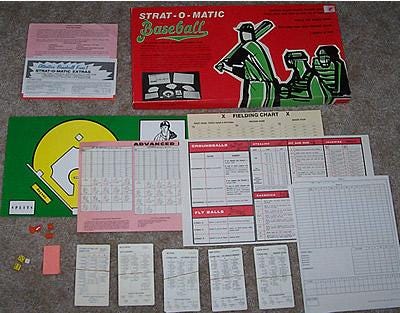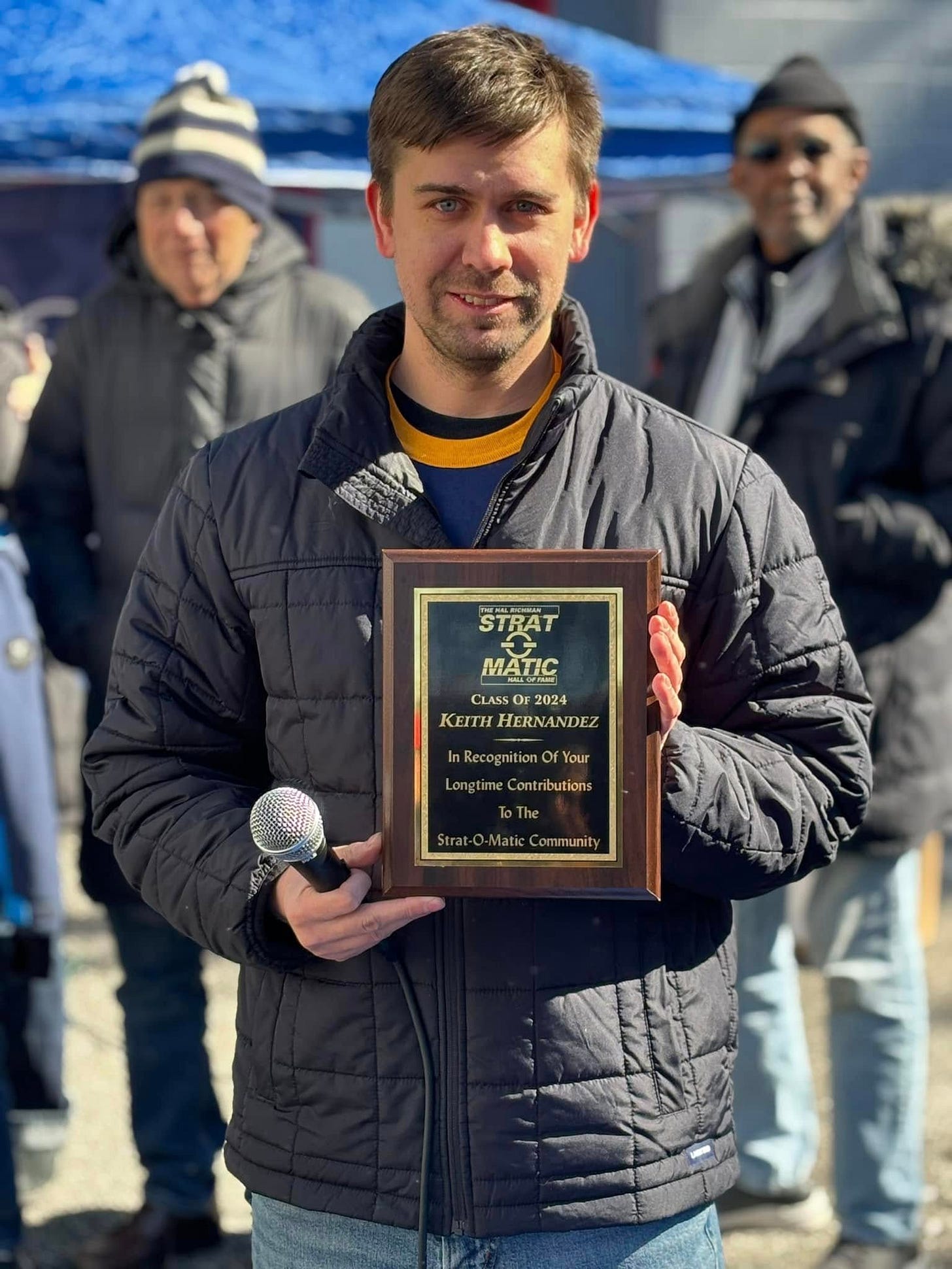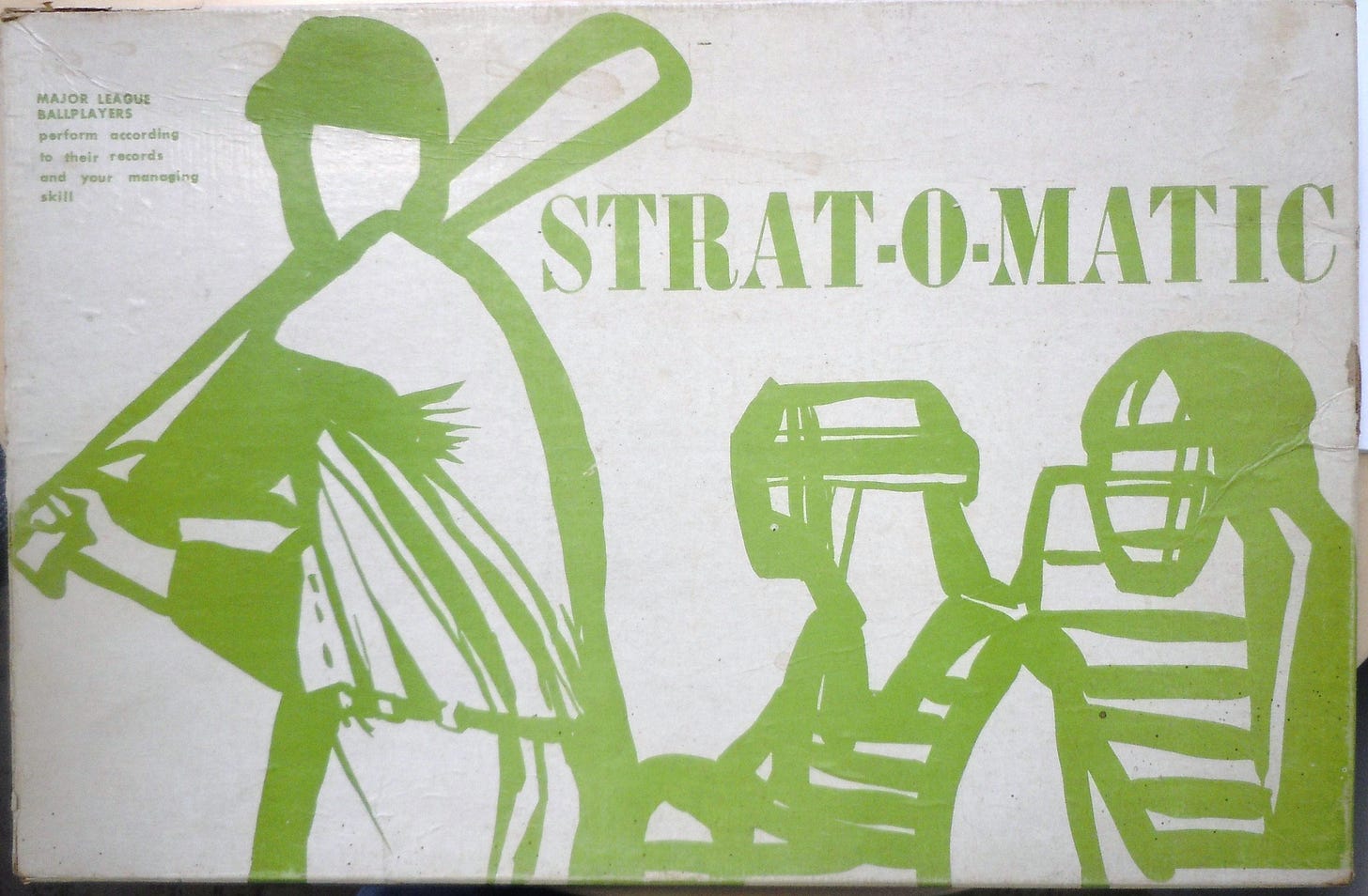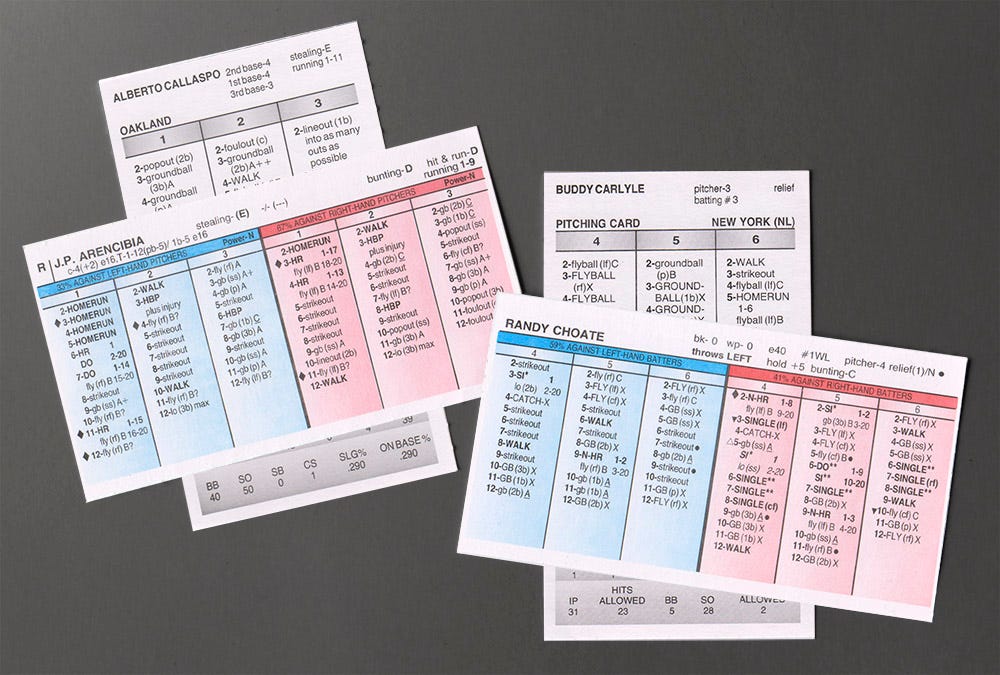Chicago Sports Stuff Partners With the O.G. of Fantasy Sports
Strat-O-Matic’s Chief Content Officer John Garcia discusses the legacy of the first fantasy sports platform.
NEVER SAW this one coming.
It’s a Thursday, and I’m sitting there, minding my own business, guzzling water from my Owala bottle, listening to a Fender Rhodes jazz/funk megamix, writing words and paragraphs, when I get an email from a fine gentleman representing Strat-O-Matic. Said gent was wondering if Chicago Sports Stuff would be interested in joining forces with his company.
Whoa.
Y’see, I grew up with Strat-O-Matic Baseball. I created leagues. I concocted All-Star teams. I spent hours rolling the dice, and looking at the cards, and getting psyched when Ernie Banks took Cy Young over the imaginary left field wall. But life, adulthood, career, and family eventually put an end to my Strat-O (as I used to call it) career.
So naturally when I saw that email, I was like, “Yes, my new Strat-O friend, yes, forces shall be joined!”
WHAT WILL CSS DO WITH SOM, you ask? Exactly what you’d think: Devise Chicago-centric matchups and run simulated games.
Like how would the 1985 Chicago Bears perform against the 2000 Baltimore Ravens in a clash of Greatest Defenses Ever?
Or what would a round robin tournament featuring all six of the Chicago Bulls teams look like?
Or would a meeting between a Chicago Cubs team that got there (2016) and one that didn’t (1969) answer any burning questions?
And keep your eyes peeled for an epic seven-game series between the 2024 Chicago White Sox and the 1962 New York Mets.
I’d love for you, my awesome readers, to get in on the fun. If you have any matchups featuring a Chicago MLB, NFL, or NBA team you’d like simulated, send it along to ChicagoSportsStuff@gmail.com. Include the teams, the season, and a few sentences as to why you think it’s a cool clash. (Unless it’s something random like, say, the 1999 Bulls against the 2000 Bulls, it’ll probably make the cut.) We’ll be running a new sim each week, and it’ll be fascinating.
To launch what should be a badass partnership, I spoke with SOM’s Chief Content Officer John Garcia about what the platform means to sports nerds such as us:
ALAN GOLDSHER: I did grow up playing Strat-O-Matic, but I know very little about the actual history of the game. Hit me.
JOHN GARCIA: Sure! Hal Richmond invented this game as an 11-year-old. He was a kind of frustrated athlete, not as great as he wanted to be, so he played the various board games that were around and didn't really find something that he liked, so he ended up creating his own. That was around 1961, then about 10 years later, he started Strat-O-Matic.
It blew up in the 1960s, then he came out with the advanced game, I think in ‘71. He also came out with football, basketball, and hockey in the late-‘60s and early-’70s, then super-advanced started in the mid-to-late-‘80s. The advanced game added lefty/righty and pitcher endurance, closer ratings, passed balls, wild pitches, individual ground balls, and other kinds of percentages tendencies.
.A.G.: I love those in-depth, nerdy, deep-cut metrics. Last year, some of my friends and I discussed putting together a fantasy football platform that accounted for virtually every stat: completion percentage, targets, drops, and so on. But Strat-O-Matic was doing that in the ‘70s.
J.G.: The funny thing about people who played Strat-O-Matic growing up is they knew Moneyball before Moneyball became a thing, like walks and on base percentage before [those stats] became mainstream. In the late ‘80s, they came out with a computer game that allowed simulation of full seasons.
A.G.: When I was knee-deep in Strat-O-Matic, I had my little red box and I kept buying teams and teams and teams — and it got a little out of control. But that did ultimately lead to my love of fantasy sports, albeit not in a linear fashion. How did you get into it?
J.G.: I grew up on Long Island, and there happened to be an article in the paper about this game that was invented Long Island, so I picked up that game. It was a 2001 season, and I got hooked. I never needed to find another game after that — I played Strat-O-Matic all the time in my room, rolling the dice. My parents had no clue [laughs].
A.G.: Were you like me in that you mostly played it by yourself?
J.G.: Yes, I used to play only solitaire. I’d create my own 16-team leagues, and then I’d create logos for these teams — I had this whole setup. When I went to college in 2007, I joined a Windows league, which led to me to finding these other people. Then I ended up creating my own league the year after that. In 2011, it was the company's 50th anniversary, and they had a big event in the city. I ended up going partly to meet some people from my league and partly to see if I could get a job there, because I was a math stat major in college. I happened to stand online behind someone who was friends with the Richmond family — complete happenstance.
We ended up talking a little bit, and he gave me Hal's son's name, Adam, who this gentleman actually grew up with. I talked to Adam for a little bit, who said I should give him a call in a couple of weeks. I did, but there were no jobs available. [Soon after that], they posted an internship online only for college students. It didn’t really apply to me anymore, but I thought, let me try for it anyway. Adam remembered my name, and brought me in, and that was that.
A.G.: Let's get nitty gritty about the game itself. Back in the day, baseball was the only true numbers game. In basketball, you just had your main stats — points, boards, assists — and no one really cared about blocks and steals at that point. Football analytics was barely a thing, at least in the outside world.
J.G.: Yeah, obviously baseball works so well for us. It's not just a team game, it's an individual game within a team game, so you have all these individual matchups and it works really well. These other [major] sports, even though they weren’t really stat-centric at that time — or at least metric-centric — they were still broken down into numbers.
We do a lot of research for these older [basketball and football] seasons to create stats that didn't exist at the time. For instance, with basketball, it's trying to create blocks, while in baseball, it's trying to create steals. One product I'm working on now, which we haven't even announced yet, is a Diamond Gems Dead Ball set.
A.G.: I don’t even know what that is, but it sounds ridiculously cool.
J.G.: Yeah, it’s eight great teams from the 1900 and 1910 decades, so I'm going through game logs, newspapers, and creating lefty/righty stats for these pictures.
A.G.: Do you think that’ll appeal to your newer users?
J.G.: Yeah, because ‘60s, ‘70s and ‘80s [teams] do best for us — those are the teams that people grew up with. But baseball historians who play our game, they kind of love to learn about new players they didn't know before.
When I used to play, I’d use ‘40s, ‘50s, and ‘60s teams, and I’d read a book about the season [while I played]. If you want to learn more about baseball history, Strat-O-Matic is the perfect way to do it.
A.G.: How are the various sports performing?
J.G.: Baseball is probably 80% of what we do. It's a huge, huge part of our business. Football would be second and hockey and basketball would be third and fourth.
A.G.: We all know that baseball as an entity is kind of, I don't want to say falling by the wayside, that's a little too harsh, but the numbers at the stadiums and the TV ratings are both down. Has that impacted you guys in a positive or a negative way? Because it’s possible that somebody might be turned off my today’s game, but would get jazzed about revisiting the 1980s.
J.G.: I think people who play our game yearn for the kind of baseball that they grew up with. These days, you might need five, six relief pitchers every single game, but with Strat-O-Matic, I can start Bob Gibson and he's gonna go nine innings.
A.G.: Dude, I miss complete games so much.
J.G.: [Laughs] I think Strat-O-Matic allows us to play today's game any way we want to. You can take Jacob deGrom and have him go seven, eight innings…if he's healthy, that is.
A.G.: Let's say that you’re me, and you have to come up with a zillion different Chicago simulations. Give me three Chicago-centric sims you'd like to see.
J.G.: Number one would be the Bartman game. What would’ve happened if [Moisés] Alou had caught that ball?
A.G.: So you're saying redo that entire Cubs/Marlin series?
J.G.: Yes, from that point.
A.G.: Okay, that's one.
J.G.: Maybe you could try to a Cubs/Mets series from 1969?
A.G.: Love it. Last one.
J.G.: I’d do something to find out what would’ve happened had Mark Prior stayed healthy.
A.G.: Ooh, that's a good one. Maybe we could find out what the Prior/Kerry Wood rotation would’ve looked like had they had a couple more years to gel. It would’ve been like Spahn and Sain. Finally, do you think Strat-O-Matic is less stressful than regular fantasy sports?
J.G.: You would think that, but not really. You get into a good head-to-head game against somebody, and you’ll get your heart pounding.









